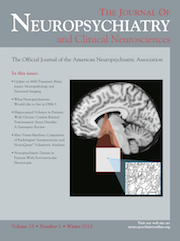To the Editor: Even though cerebellar activation has been described during theory of mind (ToM) tasks in neuroimaging studies, no previous studies have investigated ToM in a group of patients with cerebellar strokes. In the present study, we assessed 11 patients with cerebellar infarction on a variety of executive tests and with the Faux Pas test of ToM. Even if cerebellar patients showed significant deficits on executive tasks relative to a control group, no significant differences were found between the groups on the Faux Pas test. This is the first group study to demonstrate that focal cerebellar lesions do not affect ToM.
Over the last decades, several studies have highlighted that the cerebellum is involved not only in motor but also in cognitive functions, most frequently associated with executive functioning. The cognitive, emotional, and behavioral disorders shown by patients with cerebellar lesions have been claimed to constitute a Cerebellar Cognitive Affective Syndrome,
1 which may result from an underlying disruption of neural pathways that link the cerebellum with the prefrontal cortex and other cortical areas.
1,2Besides executive function, the prefrontal cortex has also been linked to other cognitive functions, such as Theory of Mind (ToM), defined as the capacity to infer others' thoughts and intentions. Even though cerebellar activation has been described during ToM tasks in neuroimaging studies
3 and the fact that cerebellar abnormalities have been described in disorders which are known to affect ToM,
4 the description of ToM deficits in patients with cerebellar strokes is to-date limited to a single case report.
5As a part of a broader study,
2 we assessed 11 adult patients with cerebellar infarctions (two women, nine men; with a mean age of 50.6 (SD: 12.1) years; mean years of education: 12.5 (SD: 2.9) on a variety of executive tests and with the Faux Pas test of ToM. In the latter, participants were read 20 stories and asked to identify whether each did or did not contain a social
faux pas.
We found that even if significant deficits were found in the cerebellar patients on executive tasks relative to an age-, sex- and education-matched control group—these included the Wisconsin Card Sorting Test (U=33.5; p=0.032), the flexibility subscale of the Test of Attentional Performance (U=30.0; p=0.045), and a verbal fluency task (U=29.0; p=0.019)—no significant differences were found between the groups on the Faux Pas test, with controls correctly identifying a similar number of faux pas scenarios (mean: 18.2 [SD: 1.6]) as the patient group (mean: 17.7 [SD: 1.8]).
Discussion
Even though cerebellar activation has been reported during ToM tasks,
1 our patients with cerebellar strokes did not show impairment on a complex ToM test. Reconciling these findings, it can be argued that the cerebellar activation evidenced during ToM tasks might not be specifically related to their ToM content. In line with this interpretation, it is notable that the neuroimaging studies showing cerebellar activation used tasks that also required functions previously related to the cerebellum, such as speech or action observation. Future neuroimaging studies controlling for those factors should be performed in order to determine the specific role of the cerebellum in ToM.
Although neuroimaging studies can contribute to determining which brain areas are involved in a given task, only lesion studies can establish whether a brain area is critical for a certain function. To our knowledge, this is the first group study to demonstrate that focal cerebellar lesions do not affect ToM, and it further reinforces the growing evidence of role of the cerebellum in executive functions.

